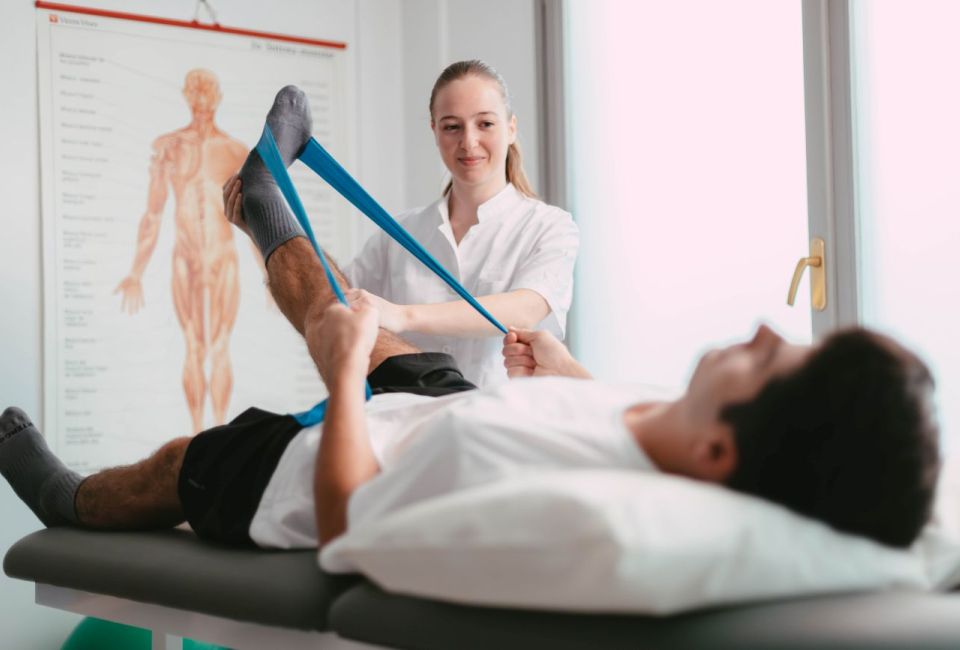
UVic's bachelor's degree course in Physiotherapy celebrates its twenty-fifth anniversary and now has 2,500 graduates
This academic year marks the twenty-fifth anniversary of the introduction of the EHEA bachelor's degree course in Physiotherapy at UVic, which means that there are now more than 2,500 professionals who have trained in its classrooms. The Faculty of Health Sciences and Welfare at the University of Vic - Central University of Catalonia (UVic-UCC) will hold a commemorative institutional event this Thursday, in the Sala Gòtica in the Casa de Convalescència building, which will bring together different voices to talk about the present, the past and the future of the profession.
The EHEA bachelor's degree course in Physiotherapy was launched in the 1998-1999 academic year, just one year after the University of Vic received recognition from the Parliament of Catalonia. The degree course has continued to grow and evolve ever since, thanks to three key factors: rising student numbers, changes in the programme of study, and the arrival of students from France.
While 80 students enrolled for Physiotherapy in the first year, there are now 160 - and there would even more if a minimum entrance grade had not been established. These significant numbers, especially among the most recent year groups (with a total of around 620 students between first and fourth year), has created major organisational and logistical challenges, such as the consolidation of three teaching lines. It has also posed a challenge in terms of the way classes are taught and for the administration of the mandatory clinical internships, as last year 355 internships took place in Spanish centres, and 425 in foreign centres.
Meanwhile, constant adjustments to the programmes of study have enabled a response to changes in the social and healthcare world. "The implementation of the new technologies required by the teaching-learning methodologies has been crucial in this evolution," says the coordinator of the degree course Carles Parés, who adds that "we have gone from having lectures with transparencies and slides to using teaching methodologies in which the student is at the centre of learning, thanks to flipped classes, problem-based learning (PBL), high-fidelity clinical simulations and degree final projects linked to research projects."
The arrival of French students has also marked a turning point in these 25 years of the bachelor's degree course. It will be ten years since the first ten students came from France, attracted by the fact that the course was taught over four academic years rather than five, and that it was not subject to any restrictions on numbers like those imposed by the French system. Indeed, French students today account for 70% of students on the bachelor's degree course, or two-thirds of those enrolled. To help students follow the classes, the decision was taken three years ago to offer the degree course in Catalan for students in the morning, and in Spanish for the two groups in the afternoon. A linguistic and administrative support programme was also launched to help students with routine procedures, and to ensure effective immersion for students, especially at the beginning of the academic year.
The bachelor's degree course currently has an employment rate of between 80 and 85%, while 90% of those who say they are employed are working in positions related to their degree. According to Carles Parés, "our goal for the future is to continue training physiotherapists who are skilled in differential diagnosis and clinical reasoning, with professional and personal competences for working in multidisciplinary teams."
The commemorative event
The central event commemorating this anniversary took place in the Sala Gòtica at UVic-UCC (the Casa de Convalescència) at 5.30 pm on Thursday 14 December, with the title of "25 years of Physiotherapy at UVic: the past, present and future of the profession."
The event included a lecture by Enric Sirvent, a retired physiotherapist and recipient of the June Nystrom prize from the College of Physiotherapists of Catalonia, who talked about "Sixty years of Catalan physiotherapy, from the basements of the Hospital Clínic to the success of a profession."
Afterwards, there was a round table discussion chaired by the lecturer Daniel Jiménez, on the "Past, present and future of physiotherapy," with the participation of the dean of the College of Physiotherapists of Catalonia, Ramon Aiguadé; the coordinator of the CAP II Maresme Rehabilitation Service and lecturer at UVic, M. Carme Sánchez; the former head of Rehabilitation at the Hospital Consortium of Vic, Pere Solé; the physiotherapist of Girona Futbol Club and former student Enric Clos; the specialist in health management at CatSalut and former student Alejandro Aragón, and the director of Fisioteràpia Clavera and former student Joan Albert Clavera.
Finally, the event focused on the professional history of the bachelor's degree course. The event was attended by the rector of UVic-UCC, Josep Eladi Baños; the dean of the Faculty of Health Sciences and Welfare, Míriam Torres, and the coordinator of the bachelor's degree course, Carles Parés.
Throughout the academic year, the bachelor's degree course has also organised an internal cinema forum, with the monthly screening of a film; Physiotherapy Day, scheduled for 20 March, which will also be based around the twenty-fifth anniversary; an exhibition, and a series of sessions for students conducted by leading physiotherapists.